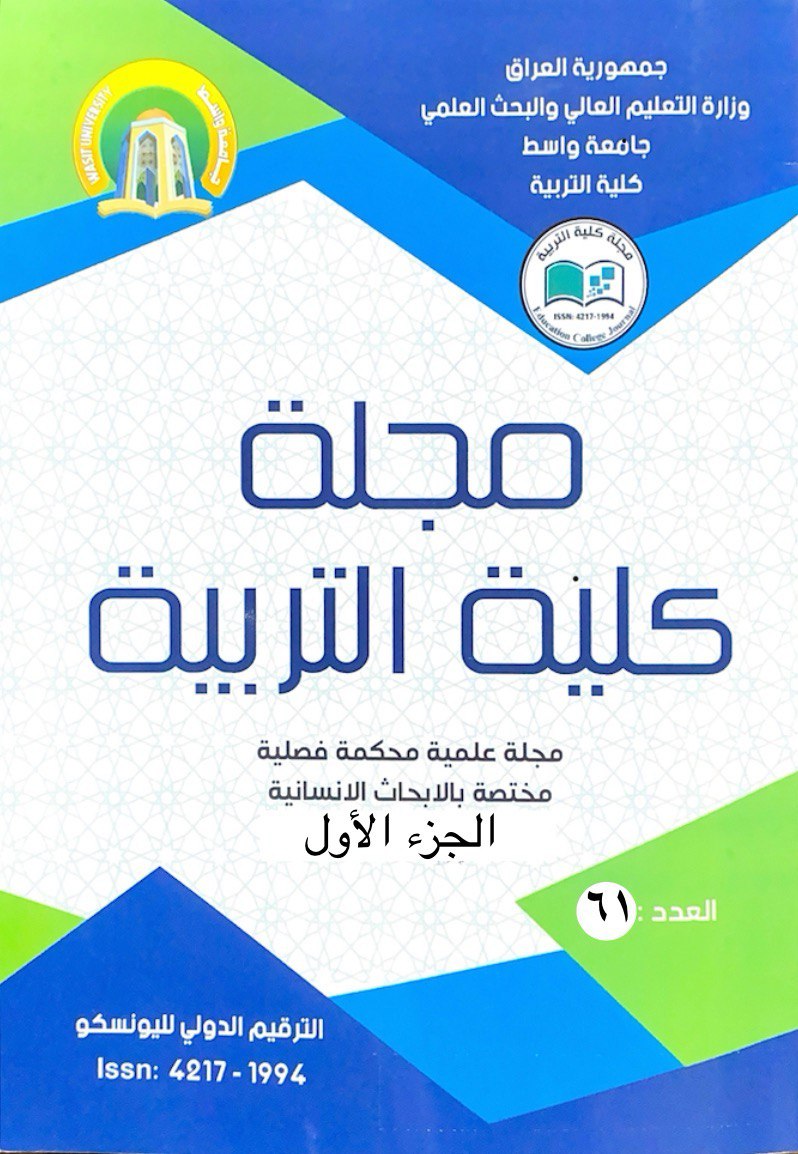Evaluation of Science Textbooks for the Elementary Stage According to STEAM Standards
DOI:
https://doi.org/10.31185/eduj.Vol61.Iss1.4554Keywords:
Textbook Evaluation, Science Textbooks, Elementary Stage, STEAM, Maryland Standards of Practice for STEM, National Core Arts Standards.Abstract
The study adopted the descriptive analytical approach and involved the development of an analysis instrument consisting of 343 indicators, distributed across 35 standards and 11 domains, based on the Maryland STEM Standards of Practice and the National Core Arts Standards (NCCAS). The content of six science textbooks for Grades 1 through 6 was analyzed using content analysis methodology, with frequencies and percentages extracted for each standard and domain.
The results indicated that the level of inclusion of STEAM standards in the science textbooks ranged between 52.48% and 58.31%, reflecting a moderate level of inclusion. The findings also showed that some standards were highly represented while a number of other standards, especially those related to the arts, were either absent or weakly included. The analysis further revealed a disparity in the distribution of standards across the grade levels, along with a clear lack of systematic integration among the STEAM components within the textbook content.
In light of these results, the researcher presented a set of recommendations, most notably: the necessity of reviewing and developing the content of science textbooks to enhance the representation of STEAM standards; incorporating and training teachers on implementing integrated education; and building curricula based on clear and coherent standard-based frameworks.
Downloads
References
المصادر العربية
1. ابو دية، أحمد .(2015). تقويم مناهج التكنولوجيا في ضوء مهارات ما وراء المعرفة. رسالة ماجستير غير منشورة. الجامعة الاسلامية بغزة.
2. السعدي، أمير محمد علي و عمر فلاح عواد الجنابي. (2025). تعليم STEAM دليل عملي للمعلمين والمدرسين الفعالين. ط1. مصر. المؤسسة العربية المتحدة للنشر والتوزيع
3. القاضي، عدنان محمد وسهام إبراهيم الربيعة .( 2018). STEM&STEAM إطار تعليمي تكاملي لرعاية الطلبة الموهوبين و المتفوقين عبر دمج العلوم والتكنولوجيا والهندسة و الفنون و الرياضيات معاً. ط1. مملكة البحرين. مكتبة دار الحكمة.
4. الكناني، عايد كريم عبد عون .(2014). مقدمة في الإحصاء و تطبيقاتSpss .ط1. عمان. دار اليازوري للنشر و التوزيع.
5. العطوي، عطا الله بن عودة.(2020)."درجة تضمين معايير STEM في كتب العلوم للمرحلة المتوسطة في المملكة العربية السعودية". مجلة الجامعة الإسلامية للعلوم التربوية والإجتماعية، (1).230-284. DOI: https://doi.org/10.36046/2162-000-001-004
6. ملكاوي، آمال وابراهيم اليوسف.(2019)."مدى تضمين معايير منحي STEM في كتب الفيزياء المطورة للمرحلة الثانوية في الأردن". المجلة الأردنية في العلوم التربوية: 15 (2).201-218.
7. القحطاني، عمشاء مناحي.(2022)."دراسة تحليلية لمقررات المهارات الرقمية بالمرحلة الابتدائية في المملكة العربية السعودية في ضوء معايير المنهج التكاملي STEM". المجلة العربية للعلوم ونشر الأبحاث: 1 (10). 21-39. DOI: https://doi.org/10.26389/AJSRP.M270422
المصادر الأجنبية
1. Iacob, M., Schuberth, K., Schneider, J., Spyropoulou, N., Papadouris, P., Subias, E., Russo, P., & Oliveras Spyros Papadakis, P. (2021). Erasmus+: Support for Policy Reform and Online Linguistic Support Competence development of STE(A)M educators through online tools and communities D7: STE(A)M education framework.
2. Ibe. (2013). Glossary of Curriculum Terminology UNESCO International Bureau of Education. www.ibe.unesco.org
3. Moore, J. J., & Holmes, K. P. (2022) The A in STEAM: Lesson Plans and Activities for Integrating Art, Ages 0–8. DOI: https://doi.org/10.4324/9781003010760-1
4. National Core Arts Standards. (n.d.). National Core Arts Standards: A Conceptual Framework for Arts Learning. www.nationalartsstandards.org.
5. Sickler-Voigt, D. C. (2023.). STEAM Teaching and Learning Through the Arts and Design: A Practical Guide for PK–12 Educators. www.arted.us. DOI: https://doi.org/10.4324/9781003183693-2
6. State, M. (2012). Maryland State STEM Standards of Practice Framework Grades K-5.
7. Stmbly, Julian, G.&, D. Hopkin, Educational and psychological measurement and evaluation, 5th, ed, Engel wood cliffs “ N, J. prentice Hall, 1972.
8. Vivian, R., Robertson, L., & Richards, M. (2020). Classroom strategies for inclusive STEM learning environments Authors.
9. yang weipeng, kewalramani sarika, & senthil jyoti. (2024). FROM STEM TO STEAM.
Downloads
Published
Issue
Section
License
Copyright (c) 2025 م. أمير محمد علي رسول السعدي

This work is licensed under a Creative Commons Attribution 4.0 International License.









